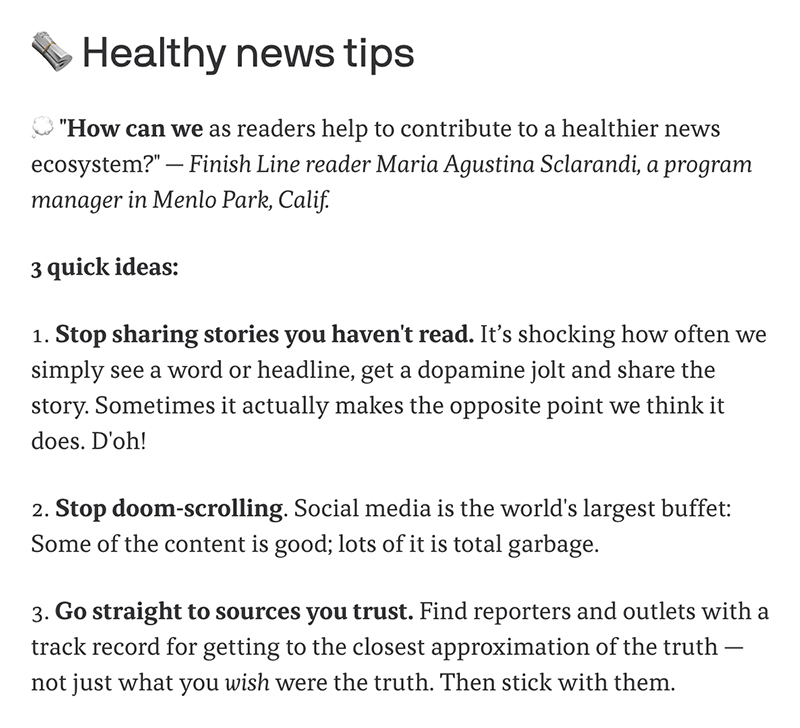Volcanoes are erupting in The Philippines, but on-fire Australia received some welcome rain. The Iran war cries have been called off and The Donald’s military powers are about to be hamstrung by the Senate. Meanwhile, his impeachment trial is starting, and we’re all on Twitter for a front-row seat.
What Could Go Right? Healthier news reading habits
And, is Russian President Vladimir Putin going down?
This is our weekly newsletter, What Could Go Right? Sign up here to receive it in your inbox every Thursday at 6am ET. You can read past issues here.
Down with doomscrolling
Talking about the perils of doomscrolling, especially during a war, might sound like the epitome of “first world problems.” But engaging with the news is an important civic responsibility, and in this day and age, with bad news constantly at our fingertips, we need to figure out how to take it in without it taking us out. The aim is balance. We should know enough to be able to respond intelligently to the world, but knowing too much is its own source of trouble. As The Progress Network (TPN) Member Maren Urner shared on Der Speigel’s podcast, “We reach exactly the same thing with over- and under-information: a passive state. One because we don’t deal with the matter, and one because our bodies can’t handle it, because it’s too much.”
So how do we Goldilocks our news reading habits? Axios’ new Finish Line newsletter had some good tips last week:

It also helps to remember that the news is designed to highlight the negative. Don’t mistake news coverage for a thorough glimpse of the world, even when there’s a horrible war going on and it seems like suffering is everywhere. Resources like this newsletter and our comrades Future Crunch and Reasons to Be Cheerful balance out the relentless focus on what’s going wrong. And here’s more from us on how to approach the news constructively.
With balance in mind, we have a small collection this week of feel-good news for nature lovers: After 40 years of absence, a critically endangered species of bat has popped up in Rwanda, easing fears that it had gone extinct. Chile is creating a new national park to protect hundreds of its glaciers. (And, now that same-sex marriage is legal there, the country saw its first gay couple tie the knot.) Nepal declared its first official bird sanctuary, which will protect hundreds of species in the country’s western wetlands. And while you may have seen a lot of “Great, now we have giant spiders parachuting from the sky”-type remarks about the “invasive” Joro spiders that are coming to the American East Coast, it turns out they can’t hurt humans, and they eat pests like mosquitoes. Not to mention it’s our fault that they are migrating, anyway—the spiders hitch rides on our trucks and cars. We admit even the photos are not for the faint of heart, but surely we can learn to live and let live with the arachnids when they do come to town.
Is Putin going down?
Perhaps buoyed and energized by such reading, and with our critical thinking skills operating at full blast, we do want to suggest a few readings on Ukraine.
Foreign policy researcher Ariel Petrovics makes the argument for the Quincy Institute that despite Ukrainian President Volodymyr Zelenskyy’s pleas for a no-fly zone, NATO’s restraint has had some beneficial effects, one of them avoiding World War III so far. The lack of direct military involvement has also “robbed,” she writes, “Putin of the ability to blame the United States and the West for its lack of military progress.” And it has kept the narrative that the Ukrainians want independence very clear, rather than the waters being muddied with the Kremlin line “that the democratically elected government in Kyiv is a puppet of the West.” Meanwhile, the Russian army’s advance is bedeviled with problems.
Take this list of several positive prognostications from political scientist Francis Fukuyama with a grain—or many—of salt, but it is the first piece we have seen that predicts Russia’s “outright defeat” in Ukraine. And while we’ll take this chance to repeat that no one knows how this situation will play out, his point that the war has damaged populists who have expressed sympathy for Putin in the past, like Brazil’s Jair Bolsonaro, Hungary’s Viktor Orban, or our very own Donald Trump, is an interesting one. Trump, for one, is backpedaling.
Wired also has two excellent pieces on Russian disinformation and the tech side of things. The invasion of Ukraine has been so universally condemned that Putin’s propaganda machine, active in the West—think online Brexit trolls—has suffered a mighty blow. “[Putin’s] usual apologists abroad have either fallen deathly silent, or, even more damning, have openly recanted their former support. And the removal of RT and Sputnik from TV networks, social media, and search engines, is, in no uncertain terms, devastating for Russia’s capacity to peddle influence,” writes Tom Southern of the nonprofit Centre for Information Resilience.
Single? Tinder is one unexpected way to poke holes in the propaganda machine inside of Russia. Activists are using dating platforms and other online tools to communicate with Russians directly about the war. We’ve seen this happening firsthand on Instagram as well, before the app was blocked there. The approach is scattershot, but we share it in the spirit of a line from American author Timothy Snyder about the war: “It is not that the good undoes the evil, but that we feel better when we know that others are acting, responding, not giving up.”
For a last note on Ukraine, if you have the energy for only one long-form piece, make it this interview with historian Stephen Kotkin in The New Yorker. Educational and engaging.
Before we go
The National Institutes of Allergy and Infectious Disease is testing three mRNA HIV vaccines in Phase 1 clinical trials. Good results could be a big deal.
In Sweden, drones are delivering defibrillators within minutes to people in cardiac arrest, beating ambulances. The article also mentions deliveries of blood, medications, vaccines, masks, and more by drone around the world.
And, we’ll see if TPN Member Scott Galloway’s “prophecy” comes true. For now there seems to be plenty of debate around the possibility of living permanently in Daylight Saving Time! (Thanks to reader Alaina for the first alert to this story.)
Below in the links section, the US takes steps to end the gender pay gap for federal workers, Covid-19 restrictions prompt a huge drop in global dengue infections, and more.
Coming March 30: What Could Go Right? Season Two

We need ideas for a better future now more than ever. Mark your calendars: season two of the What Could Go Right? podcast is coming March 30. We’ll be speaking, among many other Members, to New America CEO Anne-Marie Slaughter about Ukraine, social scientist Arthur Brooks about how to design a life filled with happiness, and Bloomberg Beta head Roy Bahat about the new era of labor organizing. Get ready now by catching up on season one and subscribing on your favorite platform! | Listen here
Progress, Please
(Found good news? Tweet at us @progressntwrk or email.)
Other good stuff in the news
United States:
- Video-game-based stroke therapy is as effective as in-person rehab | New Atlas
- The White House is moving to narrow the gender pay gap for federal workers | CBS News
- The US leads the globe in charitable giving | Axios
- New Yorkers with marijuana convictions will get the state’s first retail licenses | The New York Times (thanks to reader Danielle)
- California wants to use electric cars to back up the power grid | Vox
- Electric fields can keep kidney cells powered up while the organs are on ice | New Scientist
- A durable new plant-derived material could pave the way for sustainable plastics | MIT News
- The $1.5 trillion omnibus bill: what’s in it and why it matters | Tangle
International:
- Mounting data shows that the J&J vaccine is about as effective as Pfizer and Moderna | The New York Times
- Study: Covid restrictions prevented dengue in hundreds of thousands of people in 2020 | The New York Times
- A new ultrasound method is as effective as MRI in diagnosing prostate cancer | New Atlas
- A new law in the Philippines raises the minimum age of sexual consent from 12 to 16 | Reuters
- WHO Africa’s 1st woman leader is helping the continent fight Covid | AP
- DeepMind’s new AI model helps decipher, date, and locate ancient inscriptions | The Verge
- A virtual gallery containing thousands of Mali’s ancient documents has been launched | Africanews
TPN Member originals ![]()
Ukraine:
- In the war over Ukraine, expect the unexpected | Thomas L. Friedman
- Assumptions we need to question now | Rita McGrath
- It’s good that people want to support Ukrainian refugees. Let’s take advantage of that and do something good. | Matthew Yglesias
- Boycotting Russian culture doesn’t help Ukraine | Suzanne Nossel
- The war in Ukraine puts America’s problems in perspective | John McWhorter
- Putin’s invasion of Ukraine marks the beginning of a post-American era | Fareed Zakaria
- Why a no-fly zone over Ukraine could be—literally—the worst idea ever: In conversation with Derek Thompson | Robert Wright
- On the fate of the free Russian press, with Russian journalist Yevgenia Albats | Yascha Mounk
- What the war in Ukraine means for the world order | Ian Bremmer
- How Putin saved NATO: Adm. James Stavridis on Ukraine’s effect on the West | Jonathan Tepperman
- Putin in his labyrinth: Alexander Gabuev on the view from Moscow | Jonathan Tepperman
- War and mindfulness: The case against emoting | Robert Wright
Other:
- US pandemic policy: failures, successes, lessons | Alex Tabarrok
- What we gained from the pandemic: Five silver linings from a time of hardship and pain | Bruce Feiler
- Fountains of youth for towns | Deborah Fallows
- Guest post: Shanghai quarantine diary (part 1 of a four-part series) | James Fallows
- Are black voters really leaving the Democratic party? | Theodore R. Johnson
- Can language help people overcome hardship? | Alissa Quart
- The movement to depolarize politics | Andrew Yang and John Wood Jr.
- Feeling like you don’t belong can be good for you | Arthur C. Brooks
Non-member add:
- What if our economy valued what matters? | Mariana Mazzucato
Enrich your inner optimist with our long list of the week’s progress links.
Upcoming Events
- New Thinking: Michel Friedman und Maren Urner | Maren Urner | March 17
- Rationality: What It Is, Why It Seems Scarce, Why It Matters | Steven Pinker and Erik Brynjolfsson | March 21
- Why Is Everybody Quitting? | Scott Galloway and Adam Grant | March 23
- Managing Happiness | Arthur C. Brooks | March 30
- When the Stars Begin to Fall: Overcoming Racism and Renewing the Promise of America | Theodore R. Johnson | March 31
- Wharton Future of Work Conference | Adam Grant | April 7
- Breakthrough Dialogue 2022: Progress Problems | Ted Nordhaus | June 22–24
Until Next Time
Keep your wallet where we can see it. 👇


